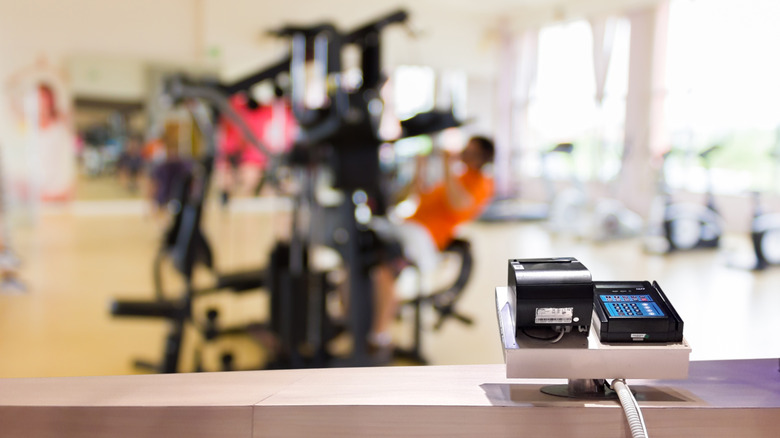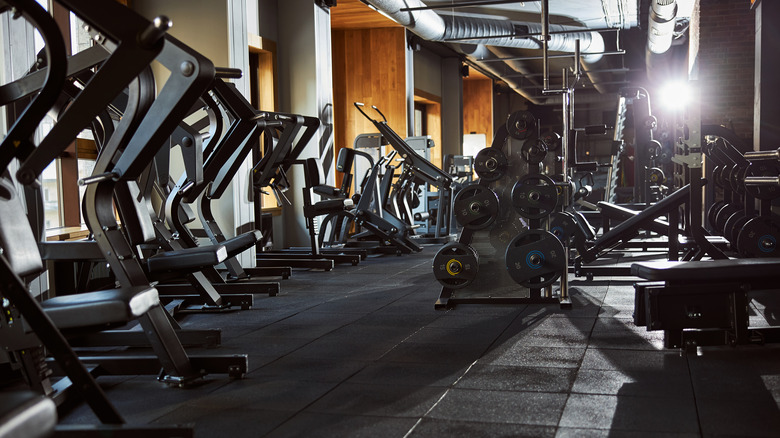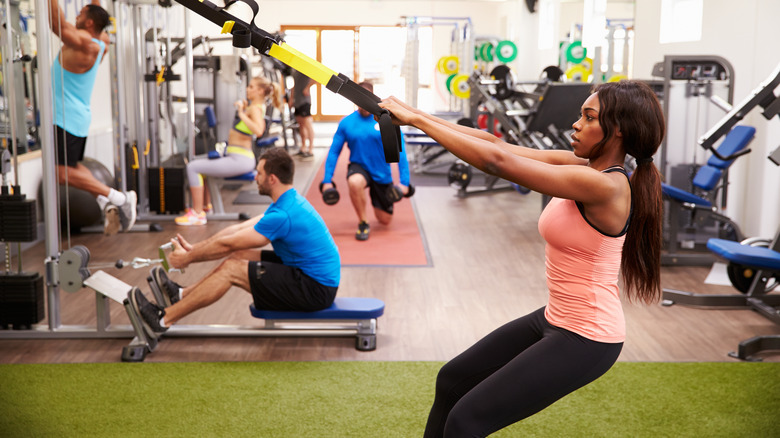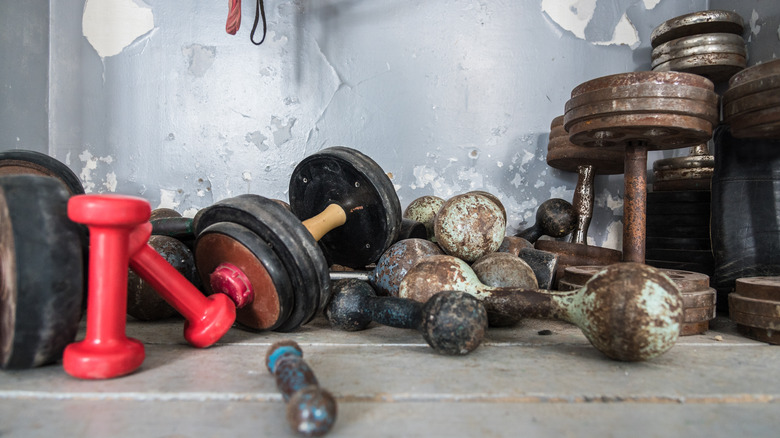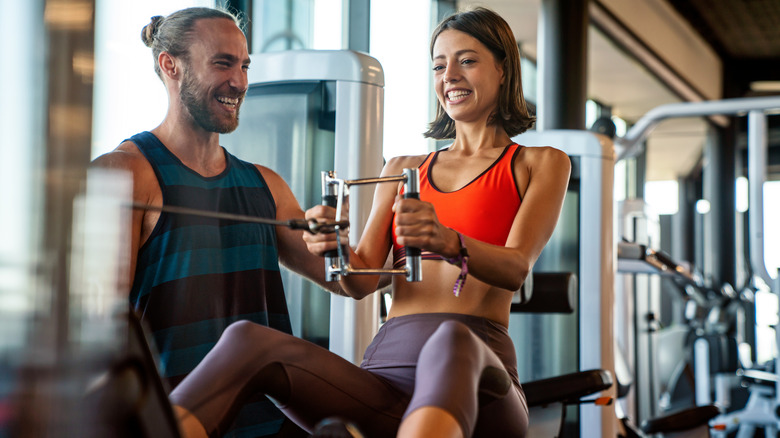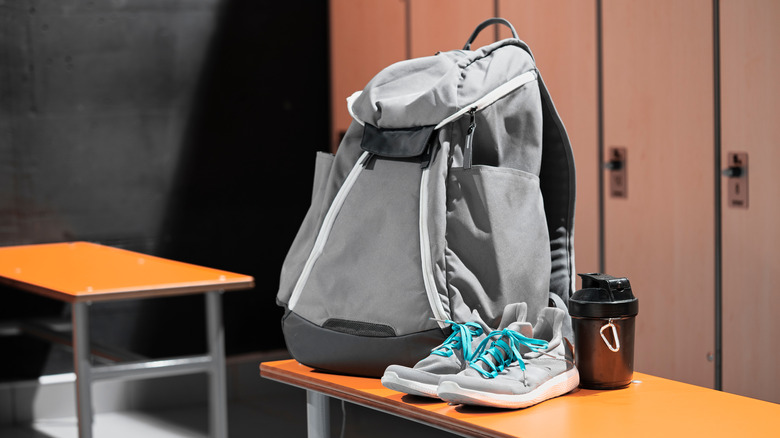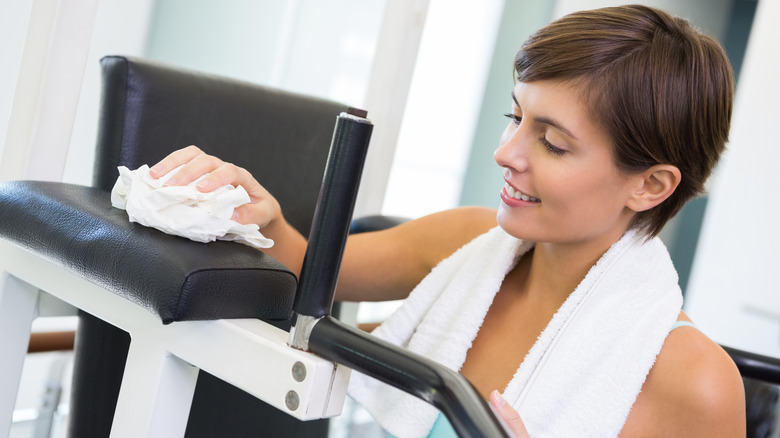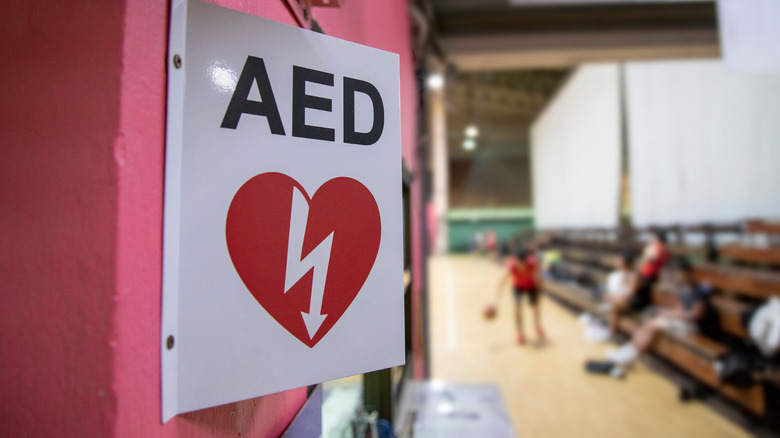Things Your Gym Doesn't Want You To Know
Gyms seem like pretty straightforward places, right? You walk through the double doors, a gust of sweaty air hits your face, you throw your gear into a locker, put some Beyoncé on in your headphones, and then you get to work. If you do this enough times and employ the right movements, you'll increase your fitness. That is simple enough.
But gyms are businesses and, like many businesses, they aim to make money. While customer satisfaction is typically high on the list of priorities, some of the jargon gracing the contracts makes us feel like gyms have something to hide. Furthermore, the contracts may make you feel like you are committing to something far more esoteric and complicated than a community center. It can feel easier opening a new bank account than it is to join a new gym — seriously! Let's take a look at some of the secrets gyms don't want any of us to know.
The fees can add up
If you're anything like us, seeking out a gym to call home is an exercise in balance. You want to get the most that you can for the most reasonable amount of money. Bills add up and adding a monthly membership into the equation can feel daunting. Gyms often advertise their low monthly rates, which they are able to offer by adding in other, sneakier fees (via U.S. News & World Report)
When the low monthly rate gets combined with maintenance fees, annual fees, registration fees, fees for towels, and occasionally extra money for group fitness classes, the price creeps up. In fact, your $20 a month gym membership can easily climb to $50 per month and beyond in some cities. The best way to ensure that you know what you are getting into is by thoroughly reading through your contract. If something isn't adding up, ask the person signing you up to explain it more completely (via Men's Journal).
Most memberships go unused
If you have ever been to a gym in January, you know that they are sheer chaos. Machines get crowded, group fitness classes turn people away, the lockers fill up. People enter each new year with dreams of grandeur. In fact, many gyms bank on at least half of their new members leaving their memberships unused after the spirit and motivation of the new year fades.
According to Exercise.com, a whopping 67% of gym memberships go unused. This means that the gym is able to apply the monthly payments to their bottom line, even though the members aren't even using the service provided. A study cited by Forbes found that the average gymgoer breaks a sweat a mere five times per month. This equates to about $15 or more per visit, making the membership much less of a value. You know yourself best. Only pay for a gym membership that you'll be stoked to use day after day.
Gyms make most of their money from the people who don't use their memberships
More startling than the fact that gyms expect a majority of their members to avoid stepping foot into the gym, they actually make a substantial chunk of their money off of the people who pay upfront and avoid the gym like the plague. Livestrong explains that the average gym membership costs around $55 a month and that there are millions of people across the United States paying that much — and many of them do not step foot inside the walls of the gym. This leaves a big chunk of automatically billed change comes out of their pockets and cushions those of the gym owners.
The math is pretty simple to work out. If 67% of the members do not show up, that means that 67% of their membership-driven income comes from members who never show up (via Exercise.com). Statistics show that Americans planned to spend around $33.25 billion in 2021, which is a hefty amount of money (via Run Repeat). Unless you love giving money away, don't pay for a gym membership you won't use.
An expensive gym is not necessarily better
You know the place — it has huge windows, vaulted ceilings, attractive and fit employees, and cutting-edge workout equipment. They charge a lot, but is it worth it? Our research suggests that shelling out the schillings for a more upscale gym may not yield a better workout or experience than a less glitzy place.
Having the latest, greatest, and fanciest equipment around is enticing, especially if you are an exercise nerd. But oftentimes when gyms cough up cash for new equipment, it drives the cost of your monthly membership higher, fitness instructor Alex Cooper told the Daily Mail. Plus, if the equipment has been well-maintained and is functioning safely and properly, it isn't always necessary to upgrade — especially if the costs of constantly swapping out machines makes for a higher monthly payment.
Healthline reminds us that both new-fangled, fancy machines and free weights can provide equally effective workouts. There isn't anything inherently wrong with a fancy gym; however, it is beneficial to weigh both the glamorous and more humble options as you hunt for a gym to call your own.
The equipment isn't as clean as you think
Gym equipment can be nasty and you probably already knew that, but let us reiterate how many germs are creeping and crawling all over the gym. After all, gyms are public places used by clean people and those with, um, questionable hygiene as well. Many of the pathogens and bacteria found within fitness facilities can cause myriad infections. These infections can include respiratory, ear, eye, and skin infections — ick!
Fit Rated performed a study and found that treadmills contain 74 times more bacteria than a public bathroom water faucet, likely from people sweating and mouth-breathing while they hoof it. The exercise bikes that were swabbed contained 39 times more bacteria than a reusable, plastic cafeteria tray. Despite those two nasty findings, the researchers found that exercise bikes contain the most bacteria of all. Out of all of the bikes tested, they found that they contained 362 times more bacteria than the average toilet seat.
While this information is incredibly appalling and repulsive, it is important to remember that it is not necessarily the fault of the gym. Gyms do their best to keep things tidy, but with the amount of foot traffic that passes through the gym doors each day, the attempts might be futile. Most gyms offer disinfectant towels and spray to encourage members to clean the equipment after each use (via Fit Rated).
Abs are not necessarily made in the gym
The unfortunate truth behind six-pack abs in no way degrades the work that certified personal trainers do. That said, personal trainers and the gyms that employ them need to make money, so be wary of salespeople who overpromise results. It sounds enticing to sign up for a six-month regimen that will give you Megan Fox's body, but that isn't always very realistic — nor is that everyone's cup of tea.
The truth of the matter is that rock-hard abs emerge when your fitness routine and diet are on point. While some personal trainers hold special certifications that allow them to give nutritional advice, many of them are simply unqualified to tackle that part of the equation (via ISSA). This leaves a fairly large chasm between what is necessary for optimal results and what trainers are legally allowed to prescribe. Many trainers strike a perfect balance in this regard and are able to help and encourage you on your journey to fitness success.
Exercise and core work specifically have major benefits, so don't start skipping out on the gym just yet. It is important to know that a Greek god-like physique is often the result of years of hard work and diet (via Men's Journal). Unless you are genetically lucky, abs are generally not the result of paying a personal trainer to stand next to you while you trot along on the treadmill.
Gyms are not responsible for lost or stolen items
Perhaps you've seen the signs in the locker rooms or on the gym floor itself proclaiming that the gym is not responsible for lost or stolen items. These signs ensure that the establishment is not held liable for your belongings should they get stolen. The thing is, some people make a sport out of purchasing a day pass to the gym because it grants them access to the locker room, fitness expert and former owner of a gym in Connecticut, Tom Holland, told Livestrong. Once they have infiltrated the space, they can pick or break locks or snag the stuff that you shoved into a locker without a lock.
From your favorite metal water bottle to your more expensive items, it is often best to secure them in a non-public area just to be on the safe side. Livestrong recommends locking your things in your car. If that is not an option, gymgoers should utilize lockers that are out in the open. Remember, if your belongings do get snatched, the signs are there for a reason — to remind you that the gym is not responsible should something grow legs and simply vanish.
You can get sick from your gym
Based on the sheer amount of bacteria that coats each frequently touched surface in your gym, the fact that you can get sick from the gym shouldn't really come as a surprise. Not only do the varying degrees of hygiene and willingness to properly wipe down a machine play a role in the germ contact of any given surface, but the high volume of people who move through a busy gym in a 24-hour period can bring in hundreds if not thousands of different pathogens. While some horrific pathogens have been found on gym equipment, your body is usually primed to fight off an impending infection. But in some cases, you can still get sick (via Self).
The best way to prevent illness from the gym is to wash your hands often and avoid touching your nose, eyes, and mouth. Self recommends wiping your equipment du jour off with a sanitizing wipe before you work out, not just after.
Not all staff members are trained in the event of an emergency
This is a sad but true fact about #gymlife. In order to be a working personal trainer, you have to have a bare-bones CPR certification (per NASM). But not all staff members need to uphold this requirement. Of course, requirements vary from gym to gym, but many front desk workers are the ones who can see what is happening on the gym floor yet they might not be capable of assisting in the event of an emergency. Furthermore, AEDs are often available for use in the event that someone has a cardiac episode, but not everyone is trained to use them (via Livestrong).
AEDs, or automated external defibrillators, can help someone who is experiencing cardiac arrest. If you receive your CPR certification through the Red Cross, you will learn how to use an AED. However, AEDs are not legally required to be available for use in gyms in every state (via National Conference of State Legislatures).
Some gyms employ uncertified trainers
While we hope that safety is one of the main values of gym owners, some people are okay with turning a blind eye, especially when it comes to hiring certified personal trainers. Personal training is a fairly unregulated industry and it truly falls within the hands of the gym owners and managers to run a tight ship. Just because someone has a toned body and looked up a lot of information on the internet doesn't mean they are a personal trainer. It is important to ask questions to avoid signing a contract with any old Joe Schmoe.
Some gyms offer in-house certifications, which is essentially "bogus," Tom Holland, a fitness expert and former owner of a gym in Connecticut, explained to Livestrong. All of that said, many trainers jump through the hoops to become legitimate exercise experts. Many go above and beyond to earn tons of continuing education credits to ensure that their clients stay safe and healthy.
It is important to ask the gym staff and the trainers themselves about their credentials and years of experience. And you should totally read the waiver before you sign it. Signing it releases the gym and trainer from liability should you get hurt. You should definitely only put your trust in certified, educated trainers when your health and safety are what is at stake (via Livestrong).
Many contracts are hard to cancel
Gym contracts are contracts, after all, and they can be incredibly difficult to get out of. The logic behind this is simple. Gyms make the majority of their money off of the people who sign up and hardly go to the gym but don't cancel their automated monthly payments. It benefits the gym to make the contracts intentionally difficult to get out of, as doing so helps them make extra money each month.
The best way to ensure that you do not get trapped into an unforgiving contract is to read the fine print. If you come across something that doesn't sit right, ask questions and don't be afraid to shop around for a gym with better terms and conditions. Make sure to read the fine print about pausing or canceling a membership in the event of a pregnancy, illness or injury, or move.
If you sign up and immediately have buyers' remorse, contact the gym right away. Most gyms offer a short grace period in which you can wiggle out of the contract you just signed. But once that incredibly short grace period ends, you might be contractually bound for a year or more (via Men's Journal).
You may be able to negotiate the terms of your contract
As you're reading the fine print of a gym contract, you might come across a few clauses or fees that seem unnecessary, redundant, or plain expensive. As you read through the documents, keep an eye out for things that might be up for negotiation. Remember, the gyms want you to sign up and they want to make their options look enticing. Armed with this knowledge, you are likely to find some wiggle room to negotiate.
Smaller, more community-oriented gyms may be more up for negotiation (via Men's Journal). If you are able to negotiate the cancellation terms, an annual fee, or anything else, make sure the physical contract you sign reflects these updates. If the changes are handwritten, make sure you and the gym owner or manager initial the changes to protect the integrity of the contract should issues arise in the future, Thomas J. Simeone, a personal injury attorney, advised Men's Journal.
And truly, there is no harm in asking. Gyms want your business and if you ask for them to waive the sign-on fee, they might say yes knowing that your monthly rate will help cushion their pockets. Being told "no" is the worst thing that can happen. No harm, no foul.
You can get fit without the gym
We are not trying to harp on personal trainers, nor are we trying to shrink their client base. But one of the best kept secrets of the gym is that you can get fit without it! It is always best to consult a professional when it comes to health and wellness-related topics, but you don't necessarily need to go to a gym to do that (via Well+Good).
By going back to the basics and working out at home, you will be able to see a whole lot of progress without shelling out your rent money. Of course, many people find the cost of the gym to be well worth it. If you fall into that category, that's okay! Gyms are special places and there is something to be said for community and routine. However, if you have a pretty good grasp on how to accomplish your fitness goals, don't let salespeople undermine your intuition. At the end of the day, money is money and people want to make it. It is up to you to decide what is worth paying for and what is worth bypassing (via Men's Journal).


